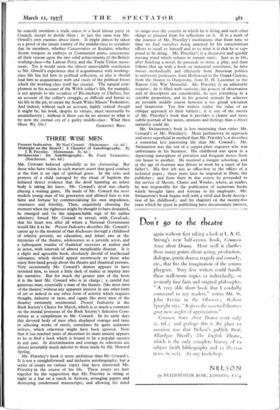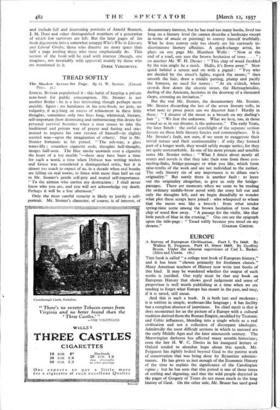THREE WISE MEN
Present Indicative. By Noel Coward. (Heinemann. 12s. 6(1.) Midnight on the Desert : A Chapter of Autobiography. By J. B. Priestley. (Heinemann. 8s. 6d.)
Swinnerton : An Autobiography. By Frank Swinnerton. (Hutchinson. los. 6d.)
Ma. COWARD behaved splendidly at his christening. But
those who have vision in such matters assert that good conduct at the font is no sign of spiritual grace. In the cries and protests of a child outraged by the ritual of baptism the initiated detect evidence that the devil haunting an infant body is taking his leave. Mr. Coward's devil was clearly playing a waiting game. He made of Mr. Coward the most modish young man of his generation and allowed him to win fame and fortune by commercialising his own impudence, smartness and frivolity. Then, exquisitely choosing the moment when the righteous might be thought to have despaired, he emerged and (to the unquenchable rage of his earlier admirers) forced Mr. Coward to reveal, with Cavalcade, that his heart was after all where a National Government would like it to be. Present Indicative describes Mr. Coward's career up to the moment of that disclosure through a childhood of relative poverty, no education, and infant awe at the mysteries of the .theatre, adolescence as a juvenile actor, and a subsequent routine of theatrical successes as author and as actor, with intervals of almost inexplicable disaster. It is a slight and agreeable book, absolutely devoid of intellectual substance, which should appeal enormously to those who enjoy first-hand gossip about the theatre and theatrical persons. Very occasionally Mr. Coward's demon appears to have
revisited him, to insert a little dash of malice or impiety into his narrative. But for much the greater part of the book it is, the later Mr. Coward who is in charge ; a candid but
generous man, essentially a man of the theatre, (like most men of the theatre) without any apparent interest in any other form of art or indeed in any other form of activity which requires thought, industry or taste, and (again like most men of the theatre) extremely sentimental. Present Indicative is the Book Society's Choice for March, which is as much a comment on the mental processes of the Book Society's Selection Com- mittee as a compliment to Mr. Coward. In its early days this devoted body of men often displayed courage and taste in selecting works of merit, sometimes by quite unknown writers, which otherwise might have been ignored. Now that it has reached years of discretion its main anxiety appears to be to find a book which is bound to be a popular success in any case. In discrimination and courage its selections are almost invariably much inferior to those made by Mr. Howard Spring. Mr. Priestley's book is more ambitious than Mr. Coward's.
It is not a straightforward and inclusive autobiography, but a series of essays on various topics that have interested Mr. Priestley in the course of his life. These essays are knit together by the supposition that Mr. Priestley is sitting at
night in a but on a ranch in Arizona, arranging papers and destroying condemned manuscripts, and allowing his mind to range over the country in which he is living and such other things as proceed from his reflections on it. It is a mark of the interest of Mr. Priestley's meditations that from time to time we find ourselves being annoyed by his conscientious efforts to recall to himself and to us what it is that he is sup- posed to be doing. Mr. Priestley's is a discursive and quickly moving mind which refuses to remain static. Just as in life, after finishing a novel, he proceeds to write a play, and then follows that up with a book on industrial conditions, he here moves methodically and efficiently from American politics to university professors, from Hollywood to the Grand Canyon, from the theatre to Ouspensky, from D. H. Lawrence to the Kansas City War Memorial. Mr. Priestley is an admirable essayist; he is filled with curiosity, his powers of observation and of description are considerable, he sees everything in a sensible proportion, and in his general attitude he achieves an enviable middle course between a too genial toleration and fanaticism. Too few writers realise the value of an oblique approach to their subject ; it is one of the merits of Mr. Priestley's book that it provides a clearer and more subtle portrait of his tastes, opinions and feelings than a direct narrative could do.
Mr. Swinnerton's book is less interesting than either Mr. Coward's or Mr. Priestley's. More perfunctory in approach and more superficial in method than Mr. Priestley's, it describes a somewhat less interesting life than Mr. Coward's. Mr. Swinnerton was the son of a copper-plate engraver who was unfortunate in his business. His childhood was spent in a depressing atmosphere of privation and frequent moves from one house to another. He received a meagre schooling, and at the age of fourteen was driven to work by a taunt of his father's. His first job was as office-boy in the offices of a technical paper ; three years later he migrated to Dent, the publisher ; and from there in due course he proceeded to the service of Messrs. Chatto and Windus, where, as reader, he was responsible for the publication of numerous books which brought fame and fortune to his employers. Mr. Swinnerton's book begins well with a vivid and lively descrip- tion of his childhood ; and his chapters on the twenty-five years which he spent in publishing have documentary interest, and include full and interesting portraits of Arnold Bennett, J. M. Dent and other distinguished members of a generation of which few survivors are left. But the later pages of his book degenerate into a somewhat scrappy Who's Who in Literary and Liberal Circles, those who deserve no more space than half a page jostling those who most emphatically do. This section of the book will be read with interest (though, one imagines, not invariably, with approval) mainly by those who















































 Previous page
Previous page